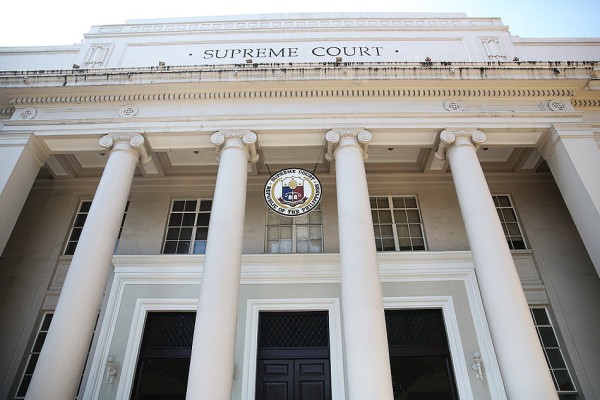[8.16] 운송 그룹' TRO 청원 vs. '연락 금지' 정책입니다.
컨텐츠 정보
- 21,898 조회
본문
마닐라 – 대법원은 아직 Metro Manila에 있는 Land Transport Office(LTO)와 일부 지방 정부의 "접촉 금지" 정책 이행을 중단하려는 운송 단체들이 제기한 청원에 대해 조치를 취하지 않았습니다.
"TRO(임시 금지 명령)를 위한 기도에 대해 아직 아무런 조치가 없습니다," 대법원 대변인 "브라이언 키스 호사카"가 화요일 메시지를 통해 기자들에게 말했습니다.
그는 앞서 8월 3일 운송 그룹인 KAPIT, Pangkalahatang Sanggunian Manila & Subbar Drivers Association, Inc., Inc.(파상 마스다), 운송 사업자 연합 및 운전자 협회에 의한 TRO 신청과 함께 certiorari의 청원을 확인했습니다. 필리핀(ALTOCAP)과 관련 운송 기구 연합(ACTO)입니다.
청원서에 응답자로 이름을 올린 사람은 마닐라, 케손시, 발렌시아, 파라냐크시, 문틴루파시의 LTO와 LGU입니다.
운송 단체들은 2016년에서 2021년 사이에 발표된 7개 조례의 발부에 이의를 제기하는데, 이 조례를 통해 교통법규(RA 4136)의 특정 조항을 인용하지 않고 운전자를 체포할 수 있다고 말했습니다.
이 조례에 의하면 교통위반죄의 징수는 교통위반죄의 1차적 책임이 있는 것으로 인정되는 체포자동차의 등기소유자에게 송부됩니다.
과태료 또는 위약금을 납부하지 않을 경우 차량의 LTO 등록 갱신이 금지됩니다.
그러나 운송 단체들에 따르면, 의회에서 통과된 "연락 금지" 정책을 만드는 법은 없습니다.
이 정책은 대면 검거를 의무화하는 것으로 추정되는 국토 교통 법규에 위배되며 등록된 소유자가 아닌 과실 운전자에게 책임을 부과한다고 그들은 말했습니다.
그들은 교통 위반에 대한 책임을 져야 할 사람은 운전자라는 근거로 운전면허 몰수를 허용하는 법 제29조를 들었습니다.
같은 법 제62조는 지방 위원회, 시 또는 시 위원회 또는 의회가 법률과 상충되는 조례를 통과시키는 것을 금지합니다.
"RA 4136에 따르면 교통 위반에 대한 대면 우려만 고려되고 등록 소유자가 과오 운전자의 교통 위반에 대해 책임을 지도록 하는 조항은 없는 것이 분명합니다."라고 청원이 밝혔습니다.
"62조, R.A. No. 4136의 권한을 적용함에 있어, 그들의 시의회를 통한 지방 정부 단위는 따라서 허용되지 않으며 실제로 해당 법의 조항과 직접 상충되는 조례를 제정하거나 시행하는 것이 금지됩니다."라고 덧붙였습니다.
교통단체들은 단일 교통위반 미납에 대한 차량 등록 자동정지에도 의문을 제기했습니다.
그들은 운전자는 "사건과 상황이 여전히 쉽게 상기될 때 교통 위반으로 추정되는 사건이 발생할 수 있는 근접성의 이익을 박탈당하기 때문에 대면 체포 때처럼 무죄를 입증하는 데 도움이 되기 때문에" 이 정책이 적법한 절차에 위배된다고 주장했습니다.
정책은 위반이 없었다는 것을 증명하기 위해 등기소유자에게 부담을 전가하고 등기소유자의 책임추정을 만든다는 주장도 있습니다.
"[T]물리적 접촉 금지 정책(사진만 봐도 위반의 증거가 되는 경우)은 행정절차에서 '피고인은 상당한 증거 또는 합리적인 마음이 수용할 수 있는 관련 증거로 자신의 주장을 입증해야 하는 부담을 등기소유자에게 전가합니다. 결론을 지지합니다."라고 탄원서가 말했습니다.
운송 그룹은 TRO를 요청하면서 운전자와 운송 노동자, 특히 공공 사업용 차량을 운영하는 노동자들의 "정량화할 수 없는 피해와 편견"을 주장했습니다. 왜냐하면 그들은 그들의 자동차를 등록할 수 없고 압류당할 수 있다는 지속적인 위협을 받고 있기 때문입니다.
"차량등록이 되지 않으면 사용할 수 없습니다. 이를 이용할 수 없다면 차량 운행에 생계가 의존하는 운전자를 비롯한 대중교통 종사자들은 생계권을 박탈당하게 된다"고 주장했습니다.
대법원 치안판사가 TRO를 발표하지는 않았지만, 10일 이내에 응답자들에게 각자의 의견을 제출할 것을 요구했다고 Hosaka는 말했습니다.
This is the Original Article from ABS-CBN NEWS
MANILA — The Supreme Court has yet to act on a petition filed by transport groups seeking to stop the implementation of the “no contact apprehension” policy of the Land Transportation Office (LTO) and some local government units in Metro Manila.
“No action yet on the prayer for TRO (temporary restraining order),” Supreme Court spokesperson "Brian Keith Hosaka" told reporters in a message Tuesday.
He earlier confirmed the filing of a petition for certiorari with an application for a TRO on August 3 by transport groups Kilusan sa Pagbabago ng Industriya ng Transportasyon, Inc. (KAPIT), Pangkalahatang Sanggunian Manila & Suburbs Drivers Association Nationwide, Inc. (Pasang Masda), Alliance of Transport Operators and Drivers Association of the Philippines (ALTOCAP) and Alliance of Concerned Transport Organization (ACTO).
Named as respondents in the petition were the LTO and the LGUs of Manila, Quezon City, Valenzuela, Parañaque City and Muntinlupa City.
The transport groups challenge the issuance of 7 ordinances issued between 2016 and 2021 which, they said, would allow traffic enforcers to apprehend motorists without citing which specific provision of the Land Transportation and Traffic Code (RA 4136) they allegedly violated.
Under these ordinances, the citations for traffic violations are sent to the registered owners of the apprehended motor vehicles, who are considered primarily liable for the commission of traffic violations.
The failure to pay the fine or penalty will bar the renewal of the LTO registration of the vehicle.
But according to the transport groups, there is no law passed by Congress that creates a “no contact apprehension” policy.
The policy, they said, contradicts the Land Transportation and Traffic Code which supposedly mandates face-to-face apprehension and imposes liability on the erring driver, not the registered owner.
They cited section 29 of the law which allows confiscation of the driver’s license as basis that it is the driver who should be held liable for traffic violations.
Section 62 of the same law prohibits provincial boards, city or municipal boards or councils from passing ordinances in conflict with the law.
“Under RA 4136, it is clear that only face to face apprehensions for traffic violations are contemplated and there is no provision that makes the registered owner liable for traffic violations of the erring driver,” the petition said.
“In applying the mandate of Sec. 62, R.A. No. 4136, the Local Government Units through their city councils are thereby not allowed and in fact are prohibited from enacting or enforcing ordinances which are in direct conflict with the provisions of said Act,” it added.
Transport groups also questioned the automatic suspension of vehicle registration for non-payment of a single traffic violation.
They claimed the policy violates their right to due process because a motorist is “deprived of the benefit of proximity in time to the alleged occurrence of a purported traffic offense, when events and circumstances are still easily recalled, aiding any advocacy to prove innocence, as it would during a face-to-face apprehension.”
The policy also allegedly shifts the burden to the registered owner to prove that there was no violation and creates a presumption of liability of the registered owner.
“[T]he No Physical Contact Policy, where the very picture alone is the proof of the violation, shifts the burden of proof to the registered owner, even though in administrative proceedings, ‘complainants carry the burden of proving their allegations with substantial evidence or such relevant evidence as a reasonable mind will accept as adequate to support a conclusion,” the petition said.
In asking for a TRO, the transport groups claimed “unquantifiable damage and prejudice” on the part of drivers and transport workers, particularly those operating public utility vehicles, because they supposedly remain under constant threat of not being able to register their motor vehicles and impounding.
“Once a vehicle is not registered, it cannot be used. If it cannot be used, drivers and other public transport workers whose livelihood is dependent on the operation of the vehicle, will be deprived of their right to earn a living,” they argued.
Although Supreme Court magistrates did not issue a TRO, they required respondents to file their respective comments within 10 days, Hosaka said.
관련자료
-
이전
-
다음


